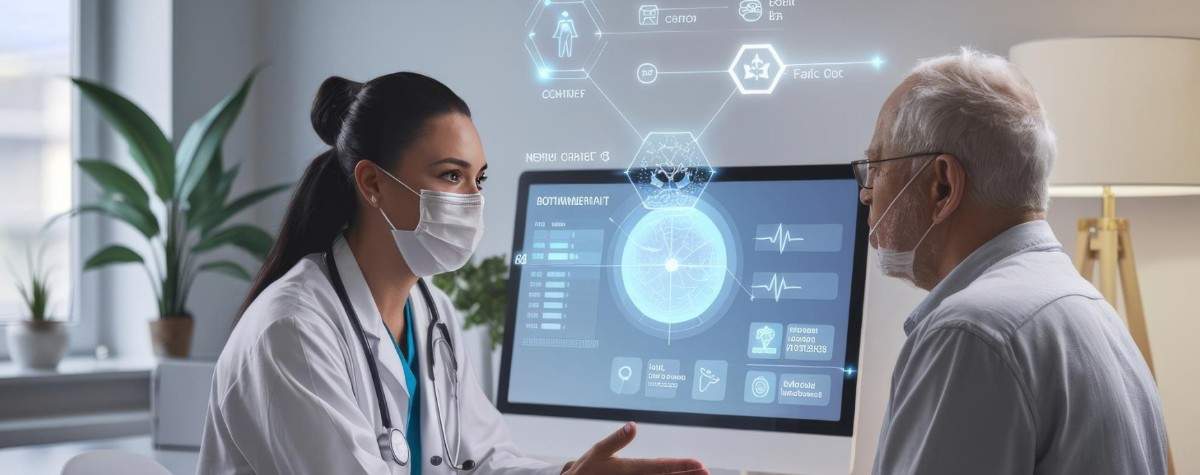


Discover the top 5 AI use cases in healthcare that transform diagnostics, patient care, & outcomes.
For innovation-focused leaders and health system executives, the critical question is no longer whether AI delivers value, but which applications create measurable improvements in patient outcomes. In this blog post, we present five practical, high-impact AI use cases in healthcare that are already delivering on that promise.
Throughout, we emphasize how AI improving patient outcomes is more than a slogan — with the right deployments, outcomes shift measurably (e.g. lower readmissions, fewer diagnostic errors, earlier interventions). Let’s also learn more about healthcare AI benefits that goes beyond hype: safety, personalization, efficiency, and scale.
One major success of applications of AI in healthcare is medical imaging, including radiology and pathology. Deep learning models, such as convolutional neural networks, can analyze CT scans, MRIs, and X-rays. AI in medical diagnosis also examines histopathology slides. These AI-powered healthcare tools detect abnormalities such as tumors, fractures, & lesions quickly and accurately.
These tools help improve patient outcomes by finding diseases early. They also reduce false negatives and positives.
A key AI use in healthcare is predictive modeling. It uses past and real-time data to predict which patients might face complications. This includes risks like sepsis, worsening health, or being readmitted before hitting a critical point.
As these systems spot risks earlier; AI improves patient outcomes and helps clinicians act sooner. They can give preventive care, adjust treatment plans, or increase monitoring. This improves patient outcomes and lowers costs in the long run, a great example of AI improving patient outcomes.
AI improves patient outcomes in remote patient monitoring (RPM). It uses artificial intelligence and IoT devices to track vitals in real time. This AI healthcare tool helps providers track patients from home. It improves care for those with chronic conditions and after surgery.
Key applications include:
The success of AI in medical devices for remote care lies in its extraordinary ability to predict and act in real-time. By reducing hospital readmissions, improving medication adherence, and facilitating timely intervention, through remote monitoring, presenting concrete clinical and economic benefits for both patients and healthcare systems due to AI for better patient outcomes.
AI-powered robotics and real-time guidance are changing surgery. They enhance precision, cut complications, and speed recovery. AI-assisted robotic surgeries can cut operation time by 25% and lower complications by 30% compared to traditional methods. AI applications in healthcare boost surgical precision by 40%. They also reduce recovery time by 15% and lessen post-surgery pain.
AI benefits various surgical specialties:
Healthcare AI tools like VirtuGuide™ speed up patient analysis. AI use cases in healthcare cut surgical planning time from weeks to days. AI models help with tissue recognition and surgical margin control. They allow surgeons to find safe dissection planes more accurately. Applications of AI in healthcare show how AI enhances patient outcomes. Healthcare AI benefits make surgery safer, faster, & more precise. Human expertise remains central to care.
AI is changing healthcare in many ways. It’s not just helping doctors anymore; it’s also improving operations and administration. AI-driven healthcare solutions make healthcare organizations smarter and leaner. They optimize scheduling, staffing, patient flow, and billing.
For example:
These healthcare AI examples illustrate how operations directly affect clinical outcomes. Reduced admin tasks lead to quicker responses, fewer delays, and happier staff. All these factors improve how AI affects patient care.
Hospitals that use intelligent automation see clear gains in efficiency and care coordination. This shows that digital transformation is more than an IT upgrade; it’s a clinical advantage.
The healthcare industry is full of promises about Artificial Intelligence. But the most important question is this: Does AI actually deliver improved patient outcomes? The difference between impact and hype shows that real progress is measured by concrete results, not flashy technology.
AI for better patient outcomes already delivers real-world benefits:
